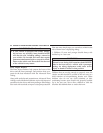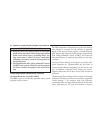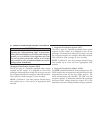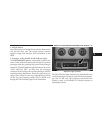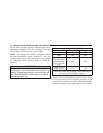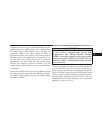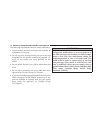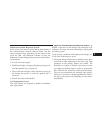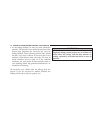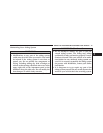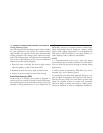
Driver and Passenger Advanced Front Airbag
Inflator Units
The Driver and Passenger Advanced Front Airbag In-
flator Units are located in the center of the steering wheel
and the right side of the instrument panel. When the
ORC detects a collision requiring the Advanced Front
Airbags, it signals the inflator units. A large quantity of
non-toxic gas is generated to inflate the Advanced Front
Airbags. Different airbag inflation rates are possible
based on collision severity and type. The steering wheel
hub trim cover and the upper right side of the instrument
panel separate and fold out of the way as the airbags
inflate to their full size. The airbags fully inflate in about
50 to 70 milliseconds. This is about half of the time it
takes to blink your eyes. The airbags then quickly deflate
while helping to restrain the driver and front passenger.
The Advanced Front Airbag gas is vented through the
vent holes in the sides of the airbag. In this way, the
airbags do not interfere with your control of the vehicle.
Along with seat belts and pretensioners, Advanced Front
Airbags work with the knee bolsters to provide improved
protection for the driver and front passenger. Side airbags
also work with seat belts to improve occupant protection.
Supplemental Side Airbag Inflatable Curtains
(SABIC)
The Supplemental Side Airbag Inflatable Curtains
(SABIC) may deploy during rollovers and collisions
where the impact is confined to a particular area of the
side of the vehicle, depending on the severity and type of
collision. In these events, the ORC will deploy the SABIC
only on the impact side of the vehicle. Because airbag
sensors estimate deceleration over time, vehicle speed
and damage by themselves are not good indicators of
whether or not an airbag should have deployed.
68 THINGS TO KNOW BEFORE STARTING YOUR VEHICLE



